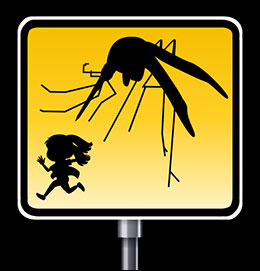West Nile mosquitoes found in The Woodlands
By Lindsay Peyton | June 16, 2014The Texas Department of State Health Services recently reported the first positive pool of West Nile mosquitoes in The Woodlands this year.
The sample was collected during surveillance the week of June 2.
Christine Mann, spokeswoman for the Texas Department of State Health Services, said residents are at risk as long as the mosquitoes are biting.
"The intensity of West Nile activity in Texas varies from year to year and depends on a variety of factors such as the weather, the number of birds and mosquitoes that maintain and spread the virus and human behavior," she said.
Mann said that last year, there were 183 human cases of West Nile in the state - and 14 deaths.
"It's still early in the season to know what kind of year we'll have," she said. "We are prepared and we conduct surveillance throughout the season."
There has been confirmed West Nile activity in mosquito pools in Dallas and Harris counties already.
"It's currently West Nile season and we're urging people to take precautions to reduce their risk of exposure to West Nile by avoiding going outdoors at dusk and dawn when mosquitoes are more active, wearing long pants and long sleeves, using insect repellent, draining standing water where mosquitoes breed and making sure there are screens on all windows and doors," Mann said.
Montgomery County Precinct 3 has started street spraying in the area of the positive test site.
A rising number of mosquitoes in the area is an expected side effect of recent rains, reports Lynne Aldrich, manager of environmental services for The Woodlands Township.
She explained that most of the mosquitoes that thrive in these conditions are not the type that carry West Nile Virus.
"We'll see flood plain mosquitoes," she said. "They're really aggressive and annoying, but they don't carry disease."
Aldrich said the culex quinquefasciatus mosquitoes, which she refers to as quinks, are the species that commonly carries the virus. The common name for the insect is the southern house mosquito.
Aldrich said that dry weather fosters quink populations. Aldrich said that dry weather can also foster quink populations. While the insect needs water to reproduce, small pools are enough to become breeding grounds, she explained. Stagnant water breeders can thrive in drier conditions.
Recent heavy downpours have washed away many of the stagnant puddles, she said.
Aldrich spends every summer testing pools of the insect for West Nile. She works with three interns to regularly visit sites where the virus has been discovered in past years.
"We have fixed sites in every village," she said. "That way we can see how the population is changing through the season."
If the team finds a mosquito that tests positive for West Nile, members go from yard to yard checking for more.
Aldrich also completes neighborhood profiles to try to determine hot spots for the insects.
"We look at the big picture, whether there are storm drains, French drains, ditches nearby or if they are on a greenbelt," she said.
The team began testing mosquitoes last week.
"We're just getting rolling," Aldrich said.
She explained that they started later than usual this year. Aldrich said that cooler temperatures delayed the mosquito season for a while.
"We did have some cold weather," she said. "It may delay the onset of the disease."
Still, she said that the virus usually follows a cycle. Since numbers were low last year, she is prepared for a busier summer.
Dr. Jim Dennett, a medical entomologist with the Harris County Public Health and Environmental Services, said his deprtment is also busy testing nearby sites in Spring and north Harris County.
"We offer year-round surveillance," he said. "We're constantly out trapping and testing mosquitoes for St. Louis encephalitis and West Nile virus."
Dr. Dennett said the numbers of mosquitoes were low this spring season. "With the rain, we're expecting a lot more nuisance mosquitoes," he said.
The Mosquito Control Division subdivides Harris County into 268 subsets for gathering sample, he added.
"We bring the mosquitoes back and dump them on a cold table, sort them and identify them," Dennett said. "If we have a positive sample, then we send the trucks to Spring."
He recommends that residents take precaution regardless of whether trucks are spraying insecticides or not.
"Avoid those periods of peak activity - dawn and dusk," Dennett said. "When you have flood water species, they'll also hit you in the middle of the day."
He also suggests wearing long sleeves, pants and lighter colors. "Make sure you use insect repellent," he said.
Aldrich and Dennett both said area residents can help their efforts, by paying attention to watering practices.
"Don't feed the storm drains," Dennett said.
Aldrich explained that if water runs off into storm drains, it can puddle, especially when yard clippings and other waste are swept into the drains, creating a blockage.
"Most frequently, the issue we run into is someone wildly over-watering their yard," she said.
Aldrich recommends adjusting auto-sprinklers to insure that water is not running over. She also suggests watering less frequently and more deeply and using compost to help soil retain water.
In addition, Aldrich asks residents to search their yards frequently for standing water, including in their water meter boxes and irrigation boxes.
Aldrich encourages everyone to report stagnant water found in public places, like puddles that last more than a few days or pools that are not regularly maintained.
"The permanent bodies of water are not a major problem because nature comes into balance," she said.
The temporary - and more accidental - pools of water are her major concern.
A half-empty drink left in the yard, a toy collecting water or even a low point in a yard can become a breeding ground.
"Go around the yard and look for stuff that collects water," Aldrich said. "They need just a tiny bit of water."
Dennett agreed. "It doesn't take a whole lot of water to generate mosquitoes," he said. "If you dump them, you eliminate mosquito production on your property."
Aldrich said the key is being as proactive as possible in the battle against mosquitoes.
She has been collecting samples for 10 years - and learned soon after beginning the process that spraying does not solve the problem.
"Everyone who knew me got a trap," she said. "And that's when we determined there were more mosquitoes the night after spraying than before."
Read the article at Chron.com
Call 866-597-6151 to learn about how to protect your home and family with a BioMist mosquito misting system.
Related Topics:
About the BioMist Mosquito Misting SystemComplete Pest Guide
Customer Feedback and Testimonials




